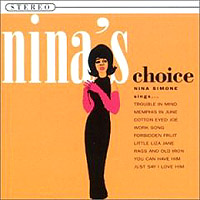This article needs additional citations for verification .(June 2025) |
| Nina's Choice | ||||
|---|---|---|---|---|
 | ||||
| Compilation album by | ||||
| Released | 1963 | |||
| Recorded | various dates, New York City (the studio recordings) | |||
| Genre | Vocal, jazz, blues, folk | |||
| Label | Colpix | |||
| Producer | various | |||
| Nina Simone chronology | ||||
| ||||
Nina's Choice is an album by singer/pianist/songwriter Nina Simone. It is a compilation of singles from previous albums at Colpix Records hand-picked by Simone. [1]